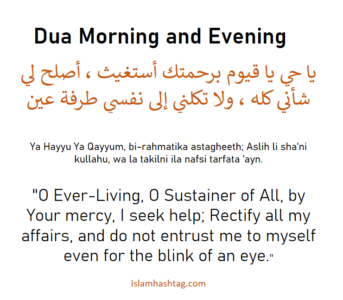Ya hayyu ya qayyum bi rahmatika astaghees benefits
The Meaning and Significance of the Supplication: “Ya Hayyu Ya Qayyum Bi Rahmatika Astaghees”
The supplication “Ya Hayyu Ya Qayyum Bi Rahmatika Astagheeth” is one of the well-known and frequently recited invocations in Islam. It is attributed to the Prophet Muhammad (peace be upon him), and it is a heartfelt dua for assistance and refuge in Allah, the Most Merciful. The Prophet (peace be upon him) used to recite this supplication when faced with difficulties and challenges.
Ya hayyu ya qayyum bi rahmatika astaghees in Arabic :
يَا حَيُّ يَا قَيُّومُ بِرَحْمَتِكَ أَسْتَغِيثُ
ya hayyu ya qayyum meaning – O ever living, O sustainer of all
Ya Hayyu Ya Qayyum, bi-rahmatika astagheeth; Aslih li sha’ni kullahu, wa la takilni ila nafsi tarfata ‘ayn meaning :
“O Ever-Living, 0 Sustainer of All, by Your mercy, I seek help; Rectify all my affairs, and do not entrust me to myself even for the blink of an eye.”
Also read Lahawla wala Quwwata
Reciting Ya Hayyu Ya Qayyum Bi Rahmatika Astaghees Morning and evening
This Dua is highly recommended for Muslims to recite in the morning and evening, after prayers, and during times of distress. It reflects the believer’s reliance on Allah and their acknowledgement of their dependence on Him. Let’s delve into the deeper meaning of this supplication:

Ya Hayyu Ya Qayyum bi rahmatika astaghees full dua reference
This supplication is authentically narrated by Anas ibn Malik (may Allah be pleased with him) in a hadith where the Prophet Muhammad (peace be upon him) advised his daughter Fatimah (may Allah be pleased with her). He said to her, “What prevents you from reciting what I have advised you to say in the morning and evening: ‘Ya Hayyu Ya Qayyum, bi-rahmatika astagheeth; Aslih li sha’ni kullahu, wa la takilni ila nafsi tarfata ‘ayn.'” (Narrated by Al-Nasai)
عن أنس بن مالك رضي الله عنه قال : قال النبي صلى الله عليه وسلم لفاطمة رضي الله عنها : ما يمنعك أن تسمعي ما أوصيك به ، أو تقولي إذا أصبحت وإذا أمسيت :
يا حي يا قيوم برحمتك أستغيث ، أصلح لي شأني كله ، ولا تكلني إلى نفسي طرفة عين
رواه النسائي وقد ورد هذا الدعاء ، بلفظ مقارب من حديث أبي بكرة رضي الله عنه ، أن النَّبِيَّ صَلَّى اللَّهُ عَلَيْهِ وَسَلَّمَ قَالَ :
( دَعَوَاتُ الْمَكْرُوبِ اللَّهُمَّ رَحْمَتَكَ أَرْجُو فَلَا تَكِلْنِي إِلَى نَفْسِي طَرْفَةَ عَيْنٍ أَصْلِحْ لِي شَأْنِي كُلَّهُ لَا إِلَهَ إِلَّا أَنْتَ ) هذا الدعاء من أعظم الأدعية التي تتضمن تحقيق العبودية لله رب العالمين ، وتتضمن التوسل إلى الله تعالى بأسمائه وصفاته كما يستغيث برحمته التي وسعت كل شيء، لعله ينال منها ما يسعده في دنياه وآخرته.
Ya hayyu ya qayyum birahmatika astaghees meaning
This supplication is highly recommended for believers to recite in the morning and evening, after every prayer, and in times of distress. It is a way for the believer to seek help and refuge in Allah, calling upon His mercy and grace. Let’s delve into the deeper meaning and significance of this supplication:
- Ya Hayyu Ya Qayyum: These two names of Allah, “Hayy” (the Ever-Living) and “Qayyum” (the Sustainer of All), highlight the believer’s refuge in Allah during times of distress. “Hayy” signifies that Allah’s life is eternal, with no beginning or end, while “Qayyum” reflects His self-sufficiency and continuous sustenance of all creation.
- Bi-rahmatika astagheeth: By seeking refuge in Allah’s mercy, we acknowledge their dependence on God’s boundless compassion, especially in times of hardship. This part emphasizes the concept of turning to Allah in humility and seeking His help.
- Aslih li sha’ni kullahu: Here, the believer requests that Allah rectify all aspects of their life. This dua covers all dimensions, whether spiritual, worldly, or in the Hereafter. It is an expression of the believer’s desire for God’s guidance and assistance in every aspect of their existence.
- Wa la takilni ila nafsi tarfata ‘ayn: The supplicant humbly implores Allah not to entrust them to their own selves, not even for the blink of an eye. This demonstrates complete reliance on Allah’s strength and an acknowledgment of human vulnerability.
Also read:
- Healing from Past Trauma in Marriage Through Qur’anic Guidance
- FREE Sunday Tafsir Classes for Women Online
- Islamic History Classes for Kids
- Qur’an Juz 30 Tafsir Class for Kids – Enrollment Now Open
- Book Review: An Introduction to Islamic Theology
Ya Hayyu Ya Qayyum Bi Rahmatika Astagheeth Benefits
- Asking for Guidance and Assistance
By reciting this supplication, the believer acknowledges their need for Allah’s guidance and assistance in all aspects of life. It is a humble admission that they cannot rely on their own abilities or resources but depend entirely on Allah’s guidance and support.
- Seeking Rectification of All Affairs
The supplication includes a request for Allah to rectify all aspects of one’s life. The believer seeks Allah’s help in ensuring that every aspect of their life is in harmony with His will. This includes both religious and worldly matters. It reflects the believer’s desire for overall well-being and balance in their life.
- A Humble Acknowledgment of Dependence
The supplication ends with a profound acknowledgment of the believer’s utter dependence on Allah. The phrase “La Tuklini Ila Nafsi Tarfata Ayn” means “Do not entrust me to myself for even the blink of an eye.” It signifies the believer’s realization that they are constantly in need of Allah’s protection and guidance, and they cannot afford to be left to their own devices, even for a moment.
Discover more from Islam Hashtag
Subscribe to get the latest posts sent to your email.





